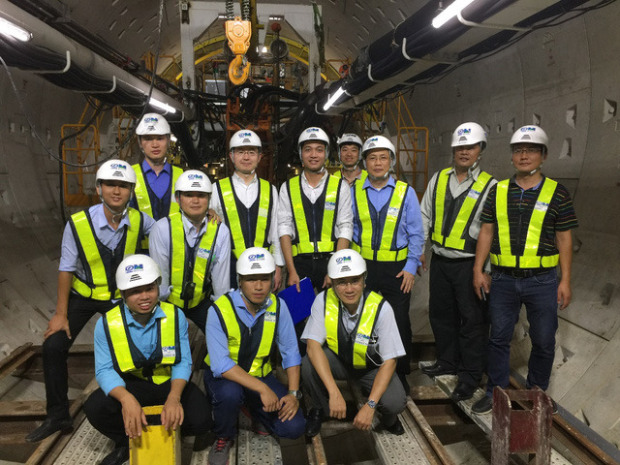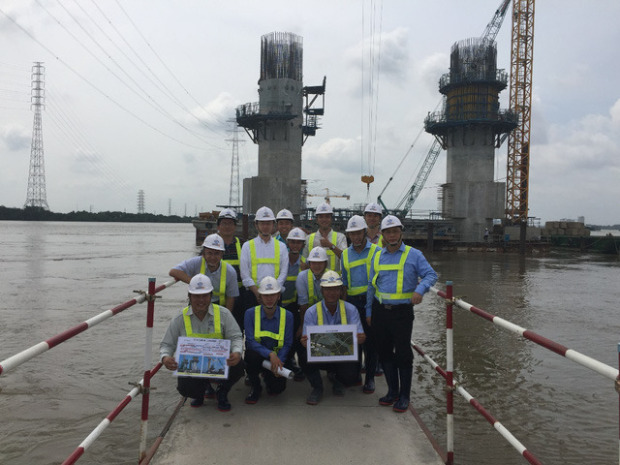Given the fast-growing number of investment projects, there is a critical need for high quality human resources in Vietnam among Japanese enterprises.
In recent years, Japan has made their way up the list to become one of the biggest investors in Vietnam. The investment projects from Japan have increased sharply in both quantity and size, especially in the field of infrastructure development, creating favorable conditions for Vietnam’s economic development. This has triggered a sharp increase in the demand for high quality human resources.
Cooperation milestones in the field of Infrastructure Engineering
It is possible to say that Japan possesses the state-of-the-art and most advanced technology in the world today, which have been deployed effectively in Vietnam.
This is evident through the fact that Japan has spent a substantial amount of ODA on infrastructure in Vietnam. Between 1992 and 2011 alone, Japan channeled USD 19.7 billion of ODA to Vietnam, the outcomes of which are 3309 km of roads and 287 bridges of all kinds being built and additional 4500 MW power being generated. This source of ODA for effective investments is continuing to grow.
Some of notable infrastructure projects invested by Japan across Vietnam can be named as 3 projects in the South, i.e. Binh Khanh bridge, Ben Thanh – Suoi Tien Metro project and Ho Chi Minh City Water Environment Improvement Project – Phase 2.
These three typical projects show that investment projects in infrastructure of Japan and Vietnam mainly focus on solving critical issues in people’s life while facilitating the regional and national economic development in the future.
Cooperation in human resource training for Infrastructure engineering
Given the fast-growing number of investment projects, there is a critical need for high quality human resources in Vietnam among Japanese enterprises.
Capturing this demand, Japan and Vietnam have joined hands in establishing Vietnam Japan University aiming at the following objectives: take advantage of Japan’s competitive edges in advanced science and technology; train high quality human resources to take over advanced technology transferred by Japan, and also to meet the demands of the global labor market.
The Master’s program in Infrastructure Engineering offered by Vietnam Japan University is built upon cooperation with Tokyo University (Japan’s top university) as the major partner and 10 other universities in Japan. The program is comprised of general knowledge, foundation and specialized knowledge. General knowledge subjects will help students acquire a broad understanding of the sustainability science, society and the environment.
Meanwhile, foundation and specialized subjects will help them accumulate knowledge and core skills related to seven major areas (1) civil and industrial construction, (2) transportation works and water management (3) bridge and road construction, (4) planning (territorial, regional and urban), (5) new material technology in construction, transportation, and infrastructure (6) maintenance of construction, transportation, and irrigation works and (7) project management.
Built upon such background, students can conduct in-depth research in the above areas with Vietnamese and Japanese faculty. With a view of becoming an advanced research-oriented institution, after only one year of operation, VJU’s Infrastructure Engineering lecturers already have about 20 ISI journal articles published on international sites under the name of VJU.

VJU lecturers and students beside the Tunneling Boring Machine in the Metro tunnel (Ben Thanh – Suoi Tien Metro Project, Ho Chi Minh City)
Some students of the program have remarkable research findings, which have been presented at international scientific conferences. Modern government-financed laboratories in the area of Infrastructure Engineering, Nanotechnology and Environmental Engineering are also expected to be put into operation by the end of 2017.
In addition to professional knowledge, a focus is also put on improving practical skills for students through field trips to Vietnamese and Japanese enterprises and project sites in these field, especially three-month internship in laboratories and businesses in Japan.
In late June 2017, a delegation of the Master’s Program in Infrastructure Engineering – VJU, headed by Prof. Nguyen Dinh Duc ( VNUHN, Program Director), Prof. Hironori Kato (Co-Director), and Dr. Phan Le Binh (JICA) took Cohort 1 students majoring in Infrastructure Engineering for a field trip to the large Japan-funded projects currently underway in the South of Vietnam.

Prof. Nguyen Dinh Duc, Prof. Hironori Kato and students of the Master’s Program in Infrastructure Engineering – Vietnam Japan University at the construction site of Binh Khanh cable-stayed bridge (Nha Be River, Ho Chi Minh City)
This field trip is a typical example of the activities that facilitate students’ direct exposure and access to the real working environment with all costs being sponsored by JICA and VJU.
In addition, in order to create the best conditions for Vietnamese students, VJU offers full and partial tuition scholarships sponsored by the Japanese government and businesses. 100% of the first cohort students are entitled to the university’s scholarships.
VJU can be considered as a world-class university in Vietnam, representing the aspiration of the two Governments and peoples.
Empowered by the support the two governments and dedication and passion of Japanese and Vietnamese lecturers, Vietnam Japan University, including the Infrastructure Engineering Program, will continue its growth momentum as a reliable institution to train high quality human resources in Vietnam and as a symbol of friendship and strategic cooperation between Vietnam and Japan.
Prof. Dr. of Science Nguyen Dinh Duc – Vietnam National University, Hanoi

